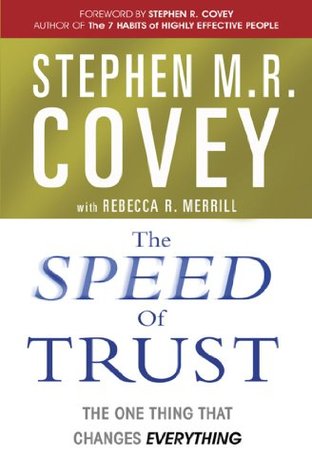More on this book
Community
Kindle Notes & Highlights
Started reading
February 23, 2020
As you go through the process of trying to restore trust you have lost with others, or forgiving and extending Smart Trust to those who have broken trust with you, you will grow in character and competence.
A PROPENSITY TO TRUST I have found that by trusting people until they prove themselves unworthy of that trust, a lot more happens. —JIM BURKE, FORMER CHAIRMAN AND CEO, JOHNSON & JOHNSON
He took me under his wing, and from the very first, he treated me exactly like he treated the MBAs and law school graduates he had also hired. I felt enormously grateful, motivated, and inspired. I did not want to let him down. It was six months before I had any results. During that time, I often doubted myself. But John Walsh kept believing in me.
His extension of trust brought out the best in me.
What’s most exciting is the realization that we can do the same for others! We can believe in them. We can extend trust to them. We can help them rise to the challenge, discover their unseen potential, and make enormous contributions that benefit us all.
Even an overdose of trust that, at times, involves the risk of being deceived or disappointed is wiser, in the long run, than taking for granted that most people are incompetent or insincere.
Leaders who extend trust to us become our mentors, models, and heroes. We’re overwhelmed with gratitude when we think about them and about the difference they have made in our lives.
It’s to bring out the best in people by entrusting them with meaningful stewardships, and to create an environment in which high-trust interaction inspires creativity and possibility.
It is better to trust and sometimes be disappointed than to be forever mistrusting and be right occasionally.
Trust brings out the best in people and literally changes the dynamics of interaction.
they don’t need external supervision, control, or the “carrot and stick” approach to motivation. They are inspired. They run with the trust they were extended. They want to live up to it. They want to give back.
“Compelling trust is the highest form of human motivation.”
“No trust given, no trust received.”
We were born with a propensity to trust. As children, most of us were naïve, innocent, vulnerable, and gullible. Through life experience, many of us have become less trusting—sometimes with good reason.
The key is in our ability to forgive, and also in our ability to balance our propensity to trust with analysis, giving us the judgment to extend the Smart Trust that maximizes the dividends and minimizes the risk.
Occasionally I’ve been burned. I’ve trusted people who didn’t come through. But for the most part, I’ve seen the incredible results when people have come through. I’ve seen them rise up to meet the expectation. I’ve seen them energized, excited, and engaged.


